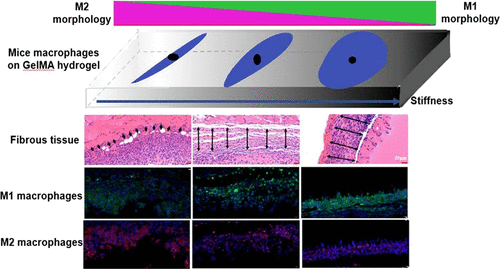当前位置:
X-MOL 学术
›
ACS Biomater. Sci. Eng.
›
论文详情
Our official English website, www.x-mol.net, welcomes your
feedback! (Note: you will need to create a separate account there.)
Control of Matrix Stiffness Using Methacrylate–Gelatin Hydrogels for a Macrophage-Mediated Inflammatory Response
ACS Biomaterials Science & Engineering ( IF 5.4 ) Pub Date : 2020-03-22 , DOI: 10.1021/acsbiomaterials.0c00295 Zhumei Zhuang 1 , Yang Zhang 2, 3 , Shengnan Sun 1 , Qiao Li 4 , Kaiwen Chen 1 , Chuanfeng An 1 , Libin Wang 1 , Jeroen J. J. P. van den Beucken 3 , Huanan Wang 1
ACS Biomaterials Science & Engineering ( IF 5.4 ) Pub Date : 2020-03-22 , DOI: 10.1021/acsbiomaterials.0c00295 Zhumei Zhuang 1 , Yang Zhang 2, 3 , Shengnan Sun 1 , Qiao Li 4 , Kaiwen Chen 1 , Chuanfeng An 1 , Libin Wang 1 , Jeroen J. J. P. van den Beucken 3 , Huanan Wang 1
Affiliation

|
The successful tissue integration of a biomedical material is mainly determined by the inflammatory response after implantation. Macrophage behavior toward implanted materials is pivotal to determine the extent of the inflammatory response. Hydrogels with different properties have been developed for various biomedical applications such as wound dressings or cell-loaded scaffolds. However, there is limited investigation available on the effects of hydrogel mechanical properties on macrophage behavior and the further host inflammatory response. To this end, methacrylate–gelatin (GelMA) hydrogels were selected as a model material to study the effect of hydrogel stiffness (2, 10, and 29 kPa) on macrophage phenotype in vitro and the further host inflammatory response in vivo. Our data showed that macrophages seeded on stiffer surfaces tended to induce macrophages toward a proinflammatory (M1) phenotype with increased macrophage spreading, more defined F-actin and focal adhesion staining, and more proinflammatory cytokine secretion and cluster of differentiation (CD) marker expression compared to those on surfaces with a lower stiffness. When these hydrogels were further subcutaneously implanted in mice to assess their inflammatory response, GelMA hydrogels with a lower stiffness showed more macrophage infiltration but thinner fibrotic capsule formation. The more severe inflammatory response can be attributed to the higher percentage of M1 macrophages induced by GelMA hydrogels with a higher stiffness. Collectively, our data demonstrated that macrophage behavior and the further inflammatory response are mechanically regulated by hydrogel stiffness. The macrophage phenotype rather than the macrophage number predominately determined the inflammatory response after the implantation, which can provide new insights into the future design and application of novel hydrogel-based biomaterials.
中文翻译:

使用甲基丙烯酸酯-明胶水凝胶控制巨噬细胞介导的炎症反应的基质刚度
生物医学材料的成功组织整合主要取决于植入后的炎症反应。巨噬细胞对植入材料的行为对于确定炎症反应的程度至关重要。已经开发出具有不同性质的水凝胶用于各种生物医学应用,例如伤口敷料或细胞负载的支架。然而,关于水凝胶力学性质对巨噬细胞行为和进一步的宿主炎症反应的影响的研究还很有限。为此,选择甲基丙烯酸甲酯-明胶(GelMA)水凝胶作为模型材料,以研究水凝胶刚度(2、10和29 kPa)对体外巨噬细胞表型的影响以及体内进一步的炎症反应。我们的数据显示,接种在较硬表面上的巨噬细胞倾向于诱导巨噬细胞趋向促炎(M1)表型,这与巨噬细胞扩散增加,更明确的F-肌动蛋白和粘着斑染色以及促炎性细胞因子分泌和分化簇(CD)标记物表达相比更趋刚度较低的表面。当将这些水凝胶进一步皮下植入小鼠体内以评估其炎症反应时,刚度较低的GelMA水凝胶显示出更多的巨噬细胞浸润,但形成的纤维化囊变薄。更严重的炎症反应可归因于具有较高硬度的GelMA水凝胶诱导的M1巨噬细胞百分比更高。总的来说,我们的数据表明,巨噬细胞的行为和进一步的炎症反应受到水凝胶硬度的机械调节。巨噬细胞表型而不是巨噬细胞数目主要决定了植入后的炎症反应,这可以为新型水凝胶基生物材料的未来设计和应用提供新的见解。
更新日期:2020-03-22
中文翻译:

使用甲基丙烯酸酯-明胶水凝胶控制巨噬细胞介导的炎症反应的基质刚度
生物医学材料的成功组织整合主要取决于植入后的炎症反应。巨噬细胞对植入材料的行为对于确定炎症反应的程度至关重要。已经开发出具有不同性质的水凝胶用于各种生物医学应用,例如伤口敷料或细胞负载的支架。然而,关于水凝胶力学性质对巨噬细胞行为和进一步的宿主炎症反应的影响的研究还很有限。为此,选择甲基丙烯酸甲酯-明胶(GelMA)水凝胶作为模型材料,以研究水凝胶刚度(2、10和29 kPa)对体外巨噬细胞表型的影响以及体内进一步的炎症反应。我们的数据显示,接种在较硬表面上的巨噬细胞倾向于诱导巨噬细胞趋向促炎(M1)表型,这与巨噬细胞扩散增加,更明确的F-肌动蛋白和粘着斑染色以及促炎性细胞因子分泌和分化簇(CD)标记物表达相比更趋刚度较低的表面。当将这些水凝胶进一步皮下植入小鼠体内以评估其炎症反应时,刚度较低的GelMA水凝胶显示出更多的巨噬细胞浸润,但形成的纤维化囊变薄。更严重的炎症反应可归因于具有较高硬度的GelMA水凝胶诱导的M1巨噬细胞百分比更高。总的来说,我们的数据表明,巨噬细胞的行为和进一步的炎症反应受到水凝胶硬度的机械调节。巨噬细胞表型而不是巨噬细胞数目主要决定了植入后的炎症反应,这可以为新型水凝胶基生物材料的未来设计和应用提供新的见解。











































 京公网安备 11010802027423号
京公网安备 11010802027423号